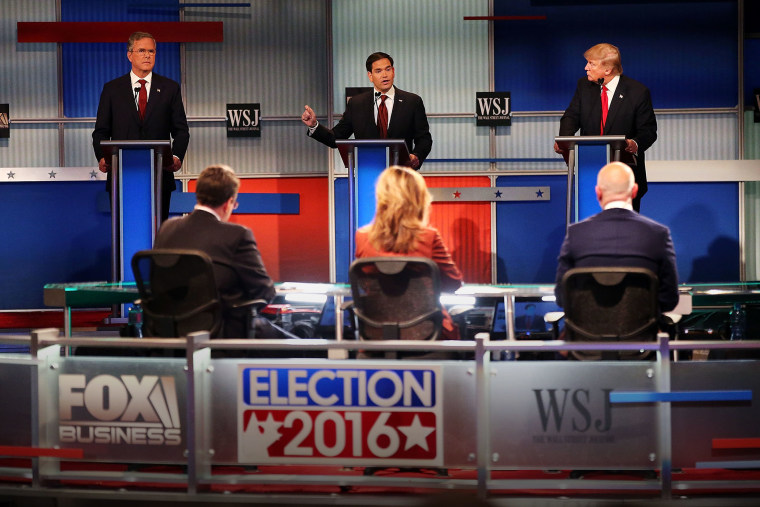The Republican presidential candidates weren't overly eager to go after one another in last night's debate, but there were a few interesting confrontations, most notably between two GOP senators.
The Wall Street Journal's Gerard Baker asked Marco Rubio about his plan to expand child tax credits, to help parents afford childcare, which may carry a price tag of $170 billion a year. "Isn't there a risk you're just adding another expensive entitlement program to an already overburdened federal budget?"
Rubio responded by talking about how great families are, and how important he thinks parents are. "I am proud that I have a pro-family tax code," the senator said, "because the pro-family tax plan I have will strengthen the most important institution in the country: the family." (Just for kicks, read that sentence again and try not to giggle.)
Rand Paul, meanwhile, was unimpressed.
"We have to decide what is conservative and what isn't conservative. Is it fiscally conservative to have a trillion-dollar expenditure? We're not talking about giving people back their tax money. He's talking about giving people money they didn't pay. It's a welfare transfer payment. "So here's what we have. Is it conservative to have $1 trillion in transfer payments -- a new welfare program that's a refundable tax credit? Add that to Marco's plan for $1 trillion in new military spending, and you get something that looks, to me, not very conservative."
Rubio responded by talking about his belief that "the family is the most important institution in society" and how he wants "the strongest military power in the world." Rand Paul warned of U.S. "bankruptcy." Both pugilists received some applause.
Considering the dispute in a broader context, a casual viewer might have seen this as an argument between a Republican touting a progressive idea -- helping parents afford child care -- and another Republican raising fiscal concerns and ideological questions about the creation of a government "entitlement."
But there's an angle that went completely overlooked.
Rubio's proposal won't work. Andrea Flynn recently had a
good piece in
The Atlantic explaining why the Florida senator's plan "would do little to bring forth the changes he promises and Americans want to see."
History tells us that tax credits do not incentivize companies to do right by their employees. As The New York Times reported, tax breaks meant to encourage companies to provide childcare and hire veterans or people with disabilities have largely been ineffective. Indeed, since 1981 the federal government has offered a tax credit for companies that provide on-site childcare, but today only 7 percent of employers offer that benefit. [...] The United States’ lack of paid family leave exacerbates and is exacerbated by the lack other benefits such as paid sick leave, affordable childcare, comprehensive health coverage, and equal pay. But Rubio and many of his colleagues aren’t proposing solutions to those problems either. They are opposed to mandating paid sick leave and equal pay and to raising the minimum wage. They want to overturn the Affordable Care Act and are tireless in their efforts to curtail reproductive health access. And they aren’t likely to make affordable childcare and universal early childhood education part of their “pro-family” campaigns.
As this relates to last night, it's the key detail that went unmentioned. Rubio said his proposed tax credits would help families; Paul said the plan is too expensive; and viewers weren't told the plan itself is wholly inadequate.
For context, note that each of the Democratic presidential candidates have childcare plans of their own, which incorporate tax incentives, though these measures are structured far differently, and are part of a more ambitious program involving universal pre-K that Republican policymakers tend to oppose.
